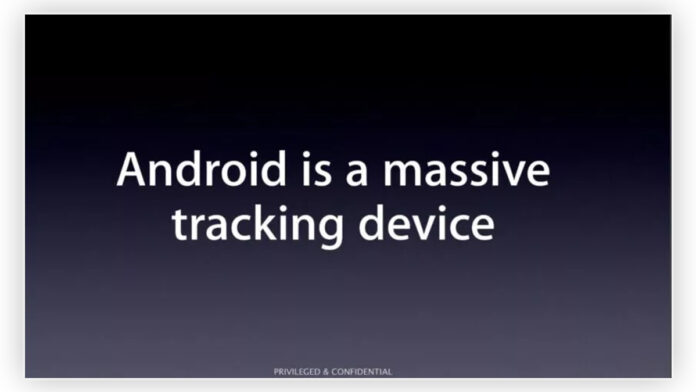The U.S. Department of Justice (DoJ) recently released new exhibits in the ongoing Google antitrust trial, revealing that Apple termed Android a “massive tracking device. ”
This revelation comes from one of the exhibits that happens to be a 2013 internal presentation from Apple, which portrays its views on privacy in Android and shows how Apple’s competitors (Google, Facebook, Amazon, and Microsoft) handled user privacy and data-collection policies.
The presentation, “Competing on Privacy,” was emailed by Eddy Cue, Apple’s Senior Vice President for Services to CEO Tim Cook, condemning Google’s method of handling privacy and user data.
The presentation was part of Cue’s testimony in the Google antitrust trial case in September and was done behind closed doors but has now been made public.
“Here is the latest slides we have on privacy. Still a lot more work to do but good start,” Cue wrote to Cook on January 13, 2013.
It throws light on Apple’s stand towards Google’s privacy policies back in 2013 and the latter’s privacy woes that the Cupertino giant could strategize upon to attract consumers to its iOS platform.
However, the biggest standout from that email was a single presentation slide from the 2013 internal communication that read, “Android is a massive tracking device”.
Although the slide’s content is redacted, it reveals Apple’s long-standing stance on user data privacy, in contrast to its privacy practices with Google’s. The company also explains how its products handle privacy better in comparison to that of the search giant.
While Apple claims that it combines data across services only to provide an improved customer experience, it blames Google for combining data across all services to serve relevant ads. The presentation also highlights how Google’s voice search is basically tied to the user’s Google account, while Apple’s Siri ties user data exclusively to the digital assistant.
The presentation also quoted a statement by Google’s former CEO, Eric Schmidt, in 2010, which read, “Google’s policy is to get right up to the creepy line but not cross it. I would argue that implanting things in your brain is beyond the creepy line. At least for the moment, until the technology gets better.”
Lastly, the presentation ends with a slide titled “Apple’s Approach to Privacy” that has a 2010 quote from Apple’s former CEO, Steve Jobs, where he said: “We take privacy very seriously… a lot of people in the Valley think we’re really old-fashioned about this.”
The internal documents reveal how Apple is taking clues from Google’s privacy woes and heavily investing in the privacy angle of iOS devices. This was made more vocal in 2019 when the company placed an ad at CES that said: “What happens on your iPhone, stays on your iPhone.”
Also, with iOS 14.5, Apple strengthened its security features on iOS devices by introducing a feature called “App Tracking Transparency” that allows users to select whether an app can track their activity across other companies’ apps and websites for the purposes of advertising or sharing with data brokers. This feature has considerably brought down tracking on iPhones.

